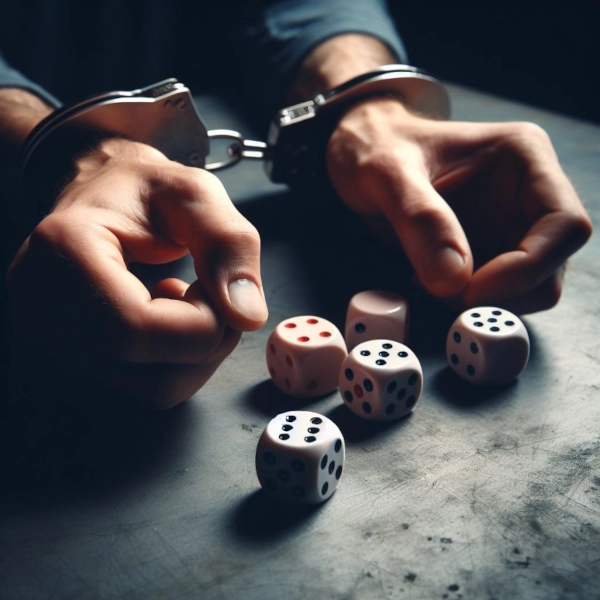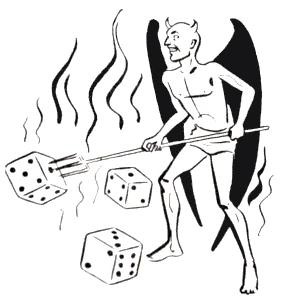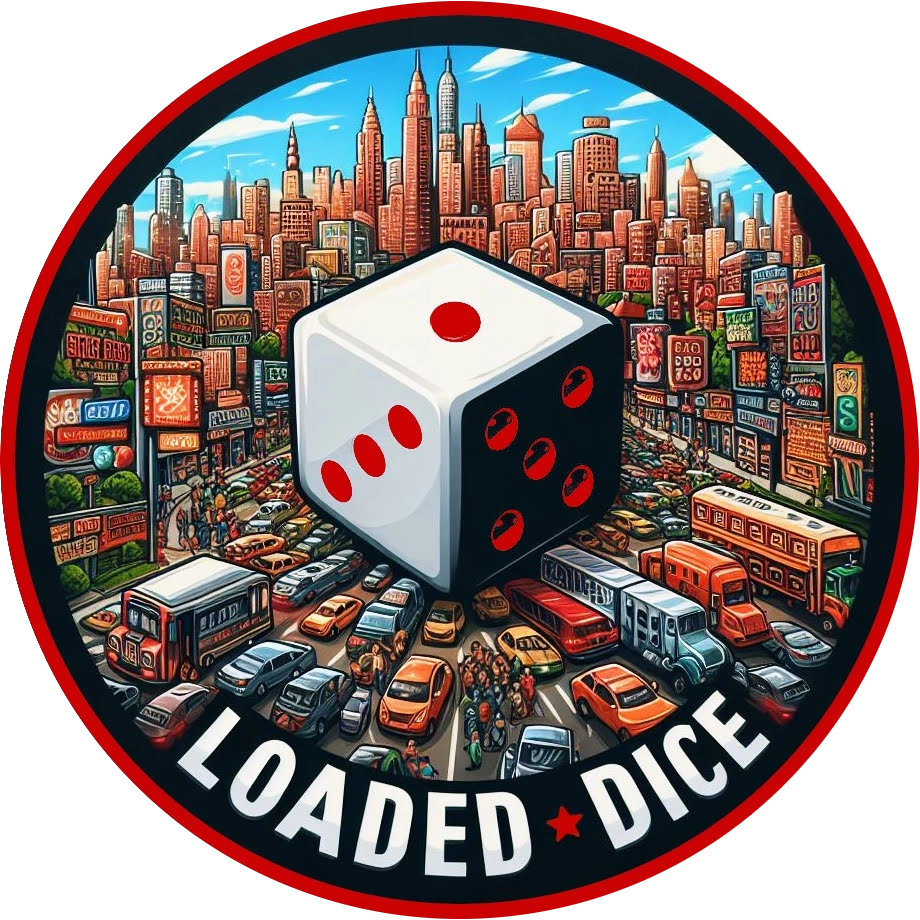Dice Crime: Yahtzee Gangs, Kidnapping, & Murder
A disturbing Yahtzee crime wave has swept across the globe with alarming intensity in recent years. The seemingly innocent dice game has become a breeding ground for nefarious activities ranging from casual cheating and organized Yahtzee gambling rings to international smuggling syndicates and shocking violent acts including kidnapping and murder. The Yahtzee Manifesto examines these troubling trends, investigating how this beloved family game has spawned an unexpected criminal underbelly. Through reader testimonials, expert analysis, and shocking case studies, we'll guide you through protecting yourself and the integrity of your Yahtzee set from those who would corrupt its noble traditions.

The notion of Yahtzee-related crime might seem paradoxical to the millions of peace-loving high rollers who cherish the game, but a dark reality lurks beneath the surface. The uncomfortable truth is that criminal elements infiltrated this ancient game long ago, creating a persistent scourge on an otherwise wholesome pastime. As one of humanity's earliest forms of gambling, dice games like Yahtzee have always attracted those seeking illicit financial gain. Yet modern Yahtzee crime transcends mere gambling violations, manifesting in surprising and increasingly disturbing ways.
Perhaps due to its accessible and seemingly innocent nature, Yahtzee has become an unlikely epicenter for criminal activity, with reports of Yahtzee-related offenses surging worldwide. Law enforcement agencies from Tokyo to Toronto report encountering increasingly organized Yahtzee gangs operating sophisticated criminal enterprises under the guise of casual gameplay.
While there would certainly be no criminals without laws to break, certain transgressions against Yahtzee represent clear violations of natural order and human decency. A comprehensive examination of crimes against Yahtzee not only informs future security protocols but serves as a stark warning to potential perpetrators. Cheating at Yahtzee remains the most pervasive form of Yahtzee crime—seemingly minor yet potentially devastating to the game's integrity. Unfortunately, tensions can escalate rapidly when stressed players face high-stakes games, transforming friendly competition into something far more sinister. What begins as breaking the rules can become a gateway to hardened criminality, with offenses ranging from information fraud to violent crimes of Yahtzee passion that have tragically ended lives.
Yahtzee Red Alert
As Yahtzee's popularity continues to grow worldwide, so too does its darker underbelly. Law enforcement agencies have identified these five major categories of Yahtzee-related criminal activity:
Yahtzee Gangs

Threat Level: High
Organized groups operating sophisticated rackets under the guise of casual gameplay. These criminal enterprises typically control territory through intimidation, with different gangs identified by signature dice colors and custom scoring pads. What began as friendly competition has escalated into full-blown Yahtzee gang warfare, with turf disputes settled not with weapons, but with weighted dice and forged Yahtzee bonuses.
Warning Signs: Players wearing matching accessories, using coded language like "full boat" instead of "full house," or enforcing unusual "house rules" with threats.
Notable Case: The "Empty House" syndicate responsible for stealing ancient Yahtzee artifacts from archaeological sites across three continents.
Yahtzee Murder

Threat Level: Extreme
The most horrific manifestation of Yahtzee-related violence, resulting from explosive emotional reactions to gameplay. Most cases involve pre-existing tensions exacerbated by the competitive nature of the game.
Warning Signs: Excessive emotional investment in outcomes, violent outbursts when failing to roll desired combinations, or threatening behavior with dice cups.
Notable Case: The tragic Christmas Day killing of Tamara Lee Mason by her three sons after she suggested a family game of Yahtzee, making her what some call "the first Yahtzee martyr."
Yahtzee Gambling

Threat Level: Medium
Illegal betting operations centered around Yahtzee outcomes, often found in back rooms of otherwise legitimate establishments. These operations typically feature modified rules to favor the house and quick game turnover to maximize profits.
Warning Signs: Unusually high stakes, professional dealers instead of self-scoring, modified dice with subtle weight imbalances, or suspicious player rotation systems.
Notable Case: The international "Triple Sixes" ring that operated Yahtzee gambling dens across 12 countries, using loaded dice and employing professional "coolers" to bring down hot streaks.
Yahtzee Kidnapping

Threat Level: Severe
Disturbing cases where victims are forced to participate in prolonged Yahtzee sessions against their will. Perpetrators typically impose arbitrary rules and punishments for perceived infractions or low scores.
Warning Signs: Excessive game duration, refusal to allow players to leave, confiscation of communication devices, or threats when someone wishes to stop playing.
Notable Case: The Florida incident where a man prevented his wife from leaving or calling for help during a Yahtzee game, facing charges of domestic battery, kidnapping, false imprisonment, and obstructing emergency services.
Florida Man Yahtzee

Threat Level: Unpredictable
A peculiar subcategory of Yahtzee crimes characterized by bizarre and often inexplicable behaviors specific to the Sunshine State. These incidents frequently involve unusual modifications to game equipment or unconventional playing environments.
Warning Signs: Games played in inappropriate locations (swamps, highway medians), dice substitutions (using alligator teeth or citrus fruits), or unusual stakes (property deeds, exotic pets).
Notable Case: Ian Stuart Wood attempting to choke his wife during what witnesses described as an otherwise pleasant family game night, adding another chapter to the infamous "Florida Man" saga.
High Intensity Dice

Before exploring the darker tales of Yahtzee-related crimes, we must understand why this seemingly innocent dice game can evoke such intense emotions. What appears to be a harmless pastime can trigger fierce competitiveness in even the most composed individuals. The tension that builds as that fifth die tumbles toward a potential Yahtzee creates a unique psychological pressure—leading to trash talk, triumphant celebrations, and occasionally explosive confrontations over the capricious nature of the dice. The inherent randomness amplifies the excitement, transforming friendly gatherings into battlegrounds of chance and strategy.
The psychological stakes in Yahtzee, as with many competitive games, are surprisingly genuine. Family game nights derailed by heated arguments and friendly rivalries escalating into intense confrontations are more common than most would admit. The compulsion to win—combined with the frustration of losing to mere chance—can drive people toward increasingly questionable tactics. Whether it's subtle rule manipulation, suspiciously generous scoring, or excessive gloating, Yahtzee's transformation from casual entertainment to cutthroat competition can occur with startling speed.
These behaviors highlight a fundamental truth about human nature: our innate drive to compete transcends setting and stakes. Whether in professional sports arenas or living room game tables, the desire for victory sometimes overwhelms our intentions for simple enjoyment. While most competitive tensions dissipate with laughter, the line between harmless rivalry and something more sinister can blur with alarming ease. This psychological foundation helps explain how underground Yahtzee gambling rings have flourished in recent years, with high-stakes games operating in backrooms across major cities, often controlled by organized Yahtzee gangs who enforce their own brutal version of the rules.
Yahtzee Murder

Given the intense emotions that Yahtzee can provoke, it's perhaps unsurprising yet deeply disturbing that the game has occasionally served as a catalyst for violent crime, sometimes with fatal consequences.
The sunshine state earned another infamous "Florida man" headline when an enraged player attempted to choke his wife during what began as a friendly game of Yahtzee. This horrifying incident of domestic violence saw the perpetrator transformed into a Yahtzee kidnapper, preventing his victim from leaving or calling for help. Fortunately, the woman survived the attack, though she was forced to abandon what witnesses described as a potentially record-breaking game in which she had already rolled three Yahtzees. Her husband—now known in crime databases as the "Yahtzee kidnapper" — faced multiple charges including domestic battery, kidnapping, false imprisonment, resisting law enforcement, and obstructing emergency services.
Even more disturbing was the case that shocked a quiet Minnesota community when three brothers committed matricide against their own mother, Tamara Lee Mason. Her offense? Simply suggesting they play Yahtzee together on Christmas Day. The brothers' lethal refusal of this innocent request transformed Tamara into what some have called "a Yahtzee martyr." This horrific case demonstrates that Yahtzee-related violence has deeper historical roots than many realize, with connections to societal upheavals and turbulent historical periods where the game served as both escape and occasional inspiration for revolutionary thought.
As documented in The Yahtzee Manifesto, the game was founded on principles of peaceful engagement. Unlike territorially aggressive games like Monopoly or Risk, Yahtzee celebrates human diversity through shared experience. True devotees understand that once a player grasps Yahtzee's essential nature, competition gives way to camaraderie, with fellow players viewed as equals on a shared journey rather than opponents to defeat. Modern Yahtzeeists often utilize the game as a vehicle for enlightenment or deeper cosmic understanding. Numerous spiritual communities worldwide—from monasteries to meditation retreats—incorporate Yahtzee practices to promote inner peace and global harmony. Few other tabletop diversions can claim such lofty aspirations.
The recent surge in Yahtzee-related physical violence therefore appears attributable not to the game itself but to larger societal dysfunctions. Unpacking these complex factors would require extensive sociological analysis beyond our current scope. Suffice it to say that even in these troubled times, we must resist scapegoating a game as noble as Yahtzee. Indeed, without the continuing popularity of Yahtzee and the spread of its non-violent philosophy, our world might face even greater turmoil than it currently endures.
Robotic Yahtzee Overlords

Yahtzee domination
As if these heinous crimes weren't enough to make you recoil in horror, the groundwork is already being laid for Yahtzee crimes of the future, potentially involving artificial intelligence.
Each April brings a fascinating convergence of technological innovation and creative engineering. While spring blooms and wildlife awakens, electronic appendages raise their metallic extremities skyward in celebration of National Robotics Week!
Yahtzee has maintained a long-standing relationship with cutting-edge technology. From Henry Ford's custom-designed "Yahtzee Stimulator" of the 1920s to contemporary electronic handhelds and sophisticated computer adaptations, Yahtzeeists across generations have embraced technological enhancements of this fundamentally simple game. However, a revolutionary development has now surpassed all previous innovations—a fully autonomous Yahtzee-playing robot making its debut at the Robotics Challenge in Las Vegas.
The aptly named "Yahtzee-Bot" features a humanoid upper body with extraordinarily dexterous hands equipped with dual opposable thumbs. This unique digital appendage configuration generates unprecedented dice manipulation capabilities, resulting in rolls of remarkable precision. The machine has undergone rigorous testing over five months, completing thousands of games daily. While the complete testing data remains classified, researchers involved with the project reveal that Yahtzee-Bot has developed a statistical preference for a specific set of hot pink, nickel-core dice. When utilizing these particular dice, the machine's average total scores increase by approximately 0.2%—a statistically significant improvement when considered across the nearly 100,000 games in its database.
This technological marvel may offer valuable insights to human players. Perhaps experimenting with different dice could enhance our own performance in ways we haven't considered. While the world's first robotic Yahtzee player represents an exciting advancement in game strategy, science fiction has repeatedly warned us about the potential dangers of unchecked artificial intelligence development. The impressive capabilities of Yahtzee-Bot raise important questions about the future relationship between humans and machines in competitive environments. Could this seemingly innocent gaming robot represent the first step toward a troubling future where Yahtzee gambling operations are run by emotionless machines or, more disturbing still, a world dominated by dice-rolling robotic overlords?
Protect Yourself and the Integrity of Yahtzee
While Yahtzee is often seen as a lighthearted family game, the concept of "Yahtzee crime" highlights actions that undermine fair play and, in the most tragic cases, can be associated with real-world violence. Understanding these potential issues is crucial for fostering a respectful and safe gaming environment.
Navigating Group Dynamics and Preventing Collusion
The social aspect of Yahtzee can sometimes lead to the formation of a "Yahtzee gang," where multiple players secretly coordinate their actions to gain an unfair advantage. This can manifest as signaling rolls, manipulating scores, or targeting a specific player. To protect yourself and the integrity of the game:
- Establish Clear Rules Upfront: Before the first roll, ensure everyone agrees on the official Yahtzee rules being used. If playing a variation, document those agreed-upon changes.
- Maintain Open Communication: Encourage players to voice any concerns or questions about gameplay. A transparent environment discourages clandestine activities.
- Be Observant: Pay attention to interactions between players, especially during scoring and rerolls. Note any unusual signals or patterns of behavior.
- Consider Independent Scoring: If playing with a larger group, having each player keep their own score sheet can reduce the opportunity for manipulation.
- Don't Hesitate to Intervene: If you suspect collusion, calmly and directly address your concerns with the group, referencing the agreed-upon rules.
Safeguarding Game Components and Preventing Intentional Interference
The integrity of a Yahtzee game relies on the honesty and respect shown towards the game materials. "Yahtzee murder," while a dramatic term, signifies the deliberate damage, hiding, or manipulation of the dice to disrupt fair play. To prevent such incidents:
- Choose a Safe Playing Area: Select a well-lit and stable surface where dice are less likely to be accidentally knocked off or lost.
- Keep Dice in Sight: Encourage players to keep their dice within view of all participants, especially during rolls and between turns.
- Address Suspicious Behavior: If a player repeatedly handles the dice in an unusual manner or if dice go missing inexplicably, address it directly but calmly.
- Have Spare Components: Keeping a backup set of dice can mitigate the impact of a lost or damaged die.
Promoting Consistent Rule Interpretation and Avoiding Bizarre Deviations
The flexibility of casual gaming can sometimes lead to the "Florida man Yahtzee" scenario, where players introduce bizarre or self-serving interpretations of the rules. To ensure fair and consistent gameplay:
- Reference Official Rules: Especially when playing with new individuals or in less formal settings, have a copy of the official Yahtzee rules available for reference.
- Discuss Rule Variations Beforehand: If your group enjoys playing with house rules, clearly articulate and agree upon these variations before the game begins.
- Challenge Unsubstantiated Claims: If a player proposes a rule interpretation that deviates significantly from the norm and lacks consensus, politely challenge it and refer to the agreed-upon rules.
- Maintain a Spirit of Fairness: Encourage a mindset where the goal is shared enjoyment of the game within a consistent framework.
Ensuring Equal Participation and Preventing Obstruction of Play
Fairness in Yahtzee dictates that every player should have an equal opportunity to roll and participate fully. The concept of a "Yahtzee kidnapper" describes a player who unfairly controls the dice, prolongs their turns excessively, or otherwise obstructs the equitable flow of the game. To prevent this:
- Establish Clear Turn Order: Ensure everyone understands the sequence of play.
- Encourage Timely Turns: Gently remind players to take their turns in a reasonable timeframe.
- Address Dice Hogging: If a player consistently handles the dice excessively or delays their rolls, politely ask them to proceed in a timely manner.
- Assert the Right to Play: Every participant has the right to a fair and unimpeded turn. If necessary, remind the group of this principle.
Navigating the Risks of Unregulated Wagering
While adding stakes to a Yahtzee game can increase excitement, unregulated or high-pressure "Yahtzee gambling" can lead to negative consequences. To approach wagering responsibly:
- Establish Clear Terms: If playing for money or other stakes, clearly define the wager, payout structure, and any rules related to betting before the game begins.
- Gamble Responsibly: Only wager amounts that you are comfortable losing. Avoid chasing losses or engaging in betting beyond your means.
- Be Wary of Unfamiliar Situations: Exercise caution when participating in Yahtzee games with strangers where the gambling terms are unclear or feel coercive.
- Know Your Limits: If you prefer to play without financial stakes, clearly communicate this preference to avoid any pressure to gamble.
Resolving Disputes About Playing Yahtzee
Even the initial desire to play can become a point of contention. When one party is enthusiastic about a game of Yahtzee and another is resistant, it's important to approach the situation with understanding and respect:
- Communicate Openly: Encourage both parties to express their reasons for wanting to play or not. Understanding the underlying motivations can lead to a better resolution.
- Find a Compromise: Perhaps suggest a shorter game, agree to play after another activity, or offer an alternative game that both parties might enjoy.
- Respect Individual Preferences: Not everyone enjoys the same activities. Forcing someone to play when they are unwilling can lead to a negative experience for everyone involved.
- Suggest Alternatives: If one person isn't in the mood for Yahtzee, offer other engaging activities that everyone can participate in.
- Schedule Game Time: If Yahtzee is a regular activity, consider scheduling specific times when everyone is generally more agreeable to play.
Understanding these potential "darker sides of Yahtzee," from minor rule infractions and disagreements about playing to the tragic reality of violence associated with the game, empowers players to create and maintain a more positive and secure gaming environment. By emphasizing clear communication, respect for the rules and game components, responsible engagement, and consideration for individual preferences, we can ensure that the focus remains on the enjoyment and camaraderie that Yahtzee is meant to provide.



